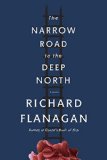Summary | Excerpt | Reading Guide | Reviews | Beyond the Book | Readalikes | Genres & Themes | Author Bio

Chapter 1
Why at the beginning of things is there always light? Dorrigo Evans' earliest memories were of sun flooding a church hall in which he sat with his mother and grandmother. A wooden church hall. Blinding light and him toddling back and forth, in and out of its transcendent welcome, into the arms of women. Women who loved him. Like entering the sea and returning to the beach. Over and over.
Bless you, his mother says as she holds him and lets him go. Bless you, boy.
That must have been 1915 or 1916. He would have been one or two. Shadows came later in the form of a forearm rising up, its black outline leaping in the greasy light of a kerosene lantern. Jackie Maguire was sitting in the Evanses' small dark kitchen, crying. No one cried then, except babies. Jackie Maguire was an old man, maybe forty, perhaps older, and he was trying to brush the tears away from his pockmarked face with the back of his hand. Or was it with his fingers?
Only his crying was fixed in Dorrigo Evans' memory. It was a sound like something breaking. Its slowing rhythm reminded him of a rabbit's hind legs thumping the ground as it is strangled by a snare, the only sound he had ever heard that was similar. He was nine, had come inside to have his mother look at a blood blister on his thumb, and had little else to compare it to. He had seen a grown man cry only once before, a scene of astonishment when his brother Tom returned from the Great War in France and got off the train. He had swung his kitbag onto the hot dust of the siding and abruptly burst into tears.
Watching his brother, Dorrigo Evans had wondered what it was that would make a grown man cry. Later, crying became simply affirmation of feeling, and feeling the only compass in life. Feeling became fashionable and emotion became a theatre in which people were players who no longer knew who they were off the stage. Dorrigo Evans would live long enough to see all these changes. And he would remember a time when people were ashamed of crying. When they feared the weakness it bespoke. The trouble to which it led. He would live to see people praised for things that were not worthy of praise, simply because truth was seen to be bad for their feelings.
That night Tom came home they burnt the Kaiser on a bonfire. Tom said nothing of the war, of the Germans, of the gas and the tanks and the trenches they had heard about. He said nothing at all. One man's feeling is not always equal to all life is. Sometimes it's not equal to anything much at all. He just stared into the flames.
2
A happy man has no past, while an unhappy man has nothing else. In his old age Dorrigo Evans never knew if he had read this or had himself made it up. Made up, mixed up, and broken down. Relentlessly broken down. Rock to gravel to dust to mud to rock and so the world goes, as his mother used to say when he demanded reasons or explanation as to how the world got to be this way or that. The world is, she would say. It just is, boy. He had been trying to wrest the rock free from an outcrop to build a fort for a game he was playing when another, larger rock dropped onto his thumb, causing a large and throbbing blood blister beneath the nail.
His mother swung Dorrigo up onto the kitchen table where the lamp light fell strongest and, avoiding Jackie Maguire's strange gaze, lifted her son's thumb into the light. Between his sobs Jackie Maguire said a few things. His wife had the week previously taken the train with their youngest child to Launceston, and not returned.
Dorrigo's mother picked up her carving knife. Along the blade's edge ran a cream smear of congealed mutton fat. She placed its tip into the coals of the kitchen range. A small wreath of smoke leapt up and infused the kitchen with the odour of charred mutton. She pulled the knife out, its glowing red tip glittering with sparkles of brilliant white-hot dust, a sight Dorrigo found at once magical and terrifying.
Excerpted from The Narrow Road to the Deep North by Richard Flanagan. Copyright © 2014 by Richard Flanagan. Excerpted by permission of Knopf, a division of Random House LLC. All rights reserved. No part of this excerpt may be reproduced or reprinted without permission in writing from the publisher.
It is among the commonplaces of education that we often first cut off the living root and then try to replace its ...
Click Here to find out who said this, as well as discovering other famous literary quotes!
Your guide toexceptional books
BookBrowse seeks out and recommends the best in contemporary fiction and nonfiction—books that not only engage and entertain but also deepen our understanding of ourselves and the world around us.